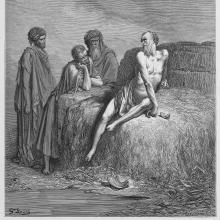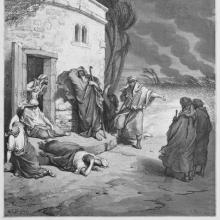Book of Job
IN THE THEOLOGY course on suffering that I teach at Lewis University, the Book of Job is required reading. Its plot can be hard to stomach: Satan believes that Job only loves God because the faithful servant has a blessed life. Looking to prove Job’s unconditional loyalty, God gives the accuser permission to take everything from Job except his life. The wager causes Job great suffering. When God finally arrives on the scene (Earth), we get some beautiful, albeit troubling, poetry. God says that God’s ways are beyond human understanding and especially human questioning. As one of my students put it last year, “God is kind of a jerk.”
Season 2 of Good Omens, streaming on Prime, leans into that confusing characterization of God. The fantasy comedy follows the unlikely friendship of Aziraphale (an angel) and Crowley (a demon). After thousands of years together on Earth, they find themselves more at home with humans than with angels or demons.
Through reclaiming missing stories and telling our own stories in terms that undermine dominant narratives, we affirm our humanity and agency, our ability to resist and interpret our lives as meaningful. We must theologically interrogate the way we tell stories and the temptation to censor marginalized people’s perspectives and histories in favor of a dominant narrative. This is because stories cut to the heart of how humans, created in the image of God, make meaning out of what happens to us.
Last year, I wrote about my journey from forcing joy to finding that love is what is everlasting, not joy — that we sometimes hear and believe that Jesus only lives in the places of our lives where we recognize him with joy. But that that is not true.
And so, almost as an afterthought, I've been thinking lately of other ideals that Christians hold as truth, somehow in the process giving a lifeless principle more weight than a Living Christ who reveals himself beyond what can be wrapped up with words and smacked with a theological bow.
Like the concept of Presence.
We know and rest our restless hearts in the idea that Jesus is with us always, lo, even unto the very end of the age. A God who never leaves us or forsakes us. And this is good. We sing songs and pray prayers and feel goose bumps and know that it is true … at least in those moments.
But what about the God who seems to be known by God’s absence as much as by God’s presence? What happens when we don't feel God’s proximity uninterrupted?
The world of Christian theology has seen its fair share of writings that address horrible suffering and the confusion about God’s character that it causes. The question has been on my mind in light of the Philippines’ calamity. Although satisfying answers are difficult to come by with a topic like this, I offer a few insights that have helped me to continue to trust God’s love. The biblical character of Job shows us how, as believers in a loving God, we should regard and respond to suffering around us.
It no longer surprises me when I hear people express cynicism and doubt about a caring God — I sometimes wonder why more Christians have not done so. Whose faith can remain undisturbed when Typhoon Haiyan kills 5,000 Filipinos and inflicts misery on thousands more? I recall a photo of a woman weeping by her child’s body inside a damaged church. Who can imagine her despair? Can we conceive of the hell endured in the same region by enslaved women and girls who are raped and degraded every day, every hour?
Oklahoma’s devastating tornado stirred up a theological debate that was set off from a series of deleted tweets referencing the Book of Job.
Popular evangelical author and speaker John Piper regularly tweets Bible verses, but two verses he tweeted after the tornado struck some as at best insensitive and at worst bad theology:
“Your sons and daughters were eating and a great wind struck the house, and it fell upon them, and they are dead.” Job 1:19
“Then Job arose and tore his robe and shaved his head and fell on the ground and worshiped.” Job 1:20
In the Book of Job, God allows Satan to afflict “blameless” Job, killing his 10 children, livestock and servants. While Piper’s tweets didn’t mention the tornado by name, critics said it was too close, and inappropriate.
Piper, who recently retired from the pulpit of Bethlehem Baptist Church in Minneapolis, is a leading theologian of the neo-Calvinist movement that’s sweeping many evangelical churches. In essence, Desiring God staffer Tony Reinke wrote, Piper was highlighting God’s sovereignty and that he is still worthy of worship in the midst of suffering and tragedy.
Many of my liberal friends never call themselves “Christians.” Their hesitancy is usually a reaction against conservative Christians who, let’s face it, are an embarrassment to the name. You know what I’m talking about – those who make crazy claims like natural disasters occur because God is angry at homosexuals. And then there are those who use phrases like, “legitimate rape.”
Influential pastor John Piper provides the latest example. While most of my friends on Facebook and Twitter lamented the devastation wrought by the Oklahoma City tornado, Piper decided to show off his biblical acumen with this tweet:
"Your sons and daughters were eating and a great wind struck the house, and it fell upon them, and they are dead." -Job 1:19
Piper’s tweet is a bit ambiguous. His reference to Job doesn’t say that God caused the tornado, but Piper has historically claimed that God causes these types of disasters. In fact, this wouldn’t be the first time Piper has tweeted something so theologically insensitive. A few years ago Piper claimed God caused a tornado in Minnesota because God was angry at homosexuals. Piper’s god is a fickle Cosmic Jerk.
*If you have not read the Book of Job, this pastor recommends it as a must-read during this time of national crisis. There is much to digest; it requires no theological confession (only a sincere concern for humanity); and it reminds us of how little we know, how much we speak.*
The Book of Job provides a helpful but not fully welcome commentary on how we might read and understand the tragic shooting at Sandy Hook Elementary School. Because that’s what we want right? Understanding? Things happen and we want to know WHY, so as to file them in our Rolodex of infinite human wisdom. Except … Job could do nothing to prevent the tragedies that befell him, and as he sat in the silence of his grief – having just lost his 10 children, his possessions, and his health – all he had was his three friends who came to sit with him. Except … sitting was not enough for them. They had to talk. They had to explain WHY this happened to Job. And in the process they forgot about Job.
Tragedies are always the occasion for extraordinary public debate: New Orleans moved from the victims to the state of FEMA in 2005; Columbine rushed us from victims to gun control; and Darfur moved from victims to foreign policy, as does Israeli-Palestinian conversation today push us away from the exiles themselves. Newtown, Conn., is no different, where a major cable news outlet was waiting in the parking lot to talk to children (not care for children, but talk to them about what was going on inside, focusing on their eyes and ears, but not their hearts). As if a 6 year old can wax eloquent on the horror they’ve witnessed. Sensationally irresponsible: some of the worst journalistic ethics I’ve seen in … well … let’s not go there.
Is God a Cosmic Jerk?
That’s how I ask the question, but professional theologians use the term theodicy. It comes from two Greek words: theo, which means “God,” and dike, which means “justice.” Theodicy asks, “If God is good and just, then why is there so much evil in the world?” There are many answers to this question. Some claim that God causes evil. In which case, my question becomes relevant – Is God a Cosmic Jerk?
Let’s first examine the word “evil.” Theologian Joe Jones succinctly defines evil in his book A Grammar of Christian Faith “as the harm to some creature’s good” (280). Jones distinguishes between two categories of evil that harms a creatures good. First, there is moral evil – the harm humans inflict upon one another through violence, injustice, and oppression. The second category is natural evil – the harm caused by cancer, earthquakes, hurricanes, and other natural events.







